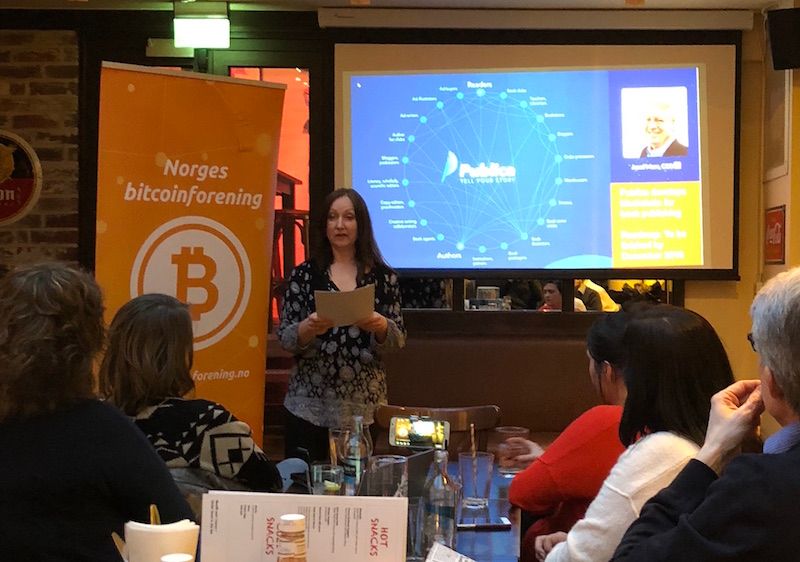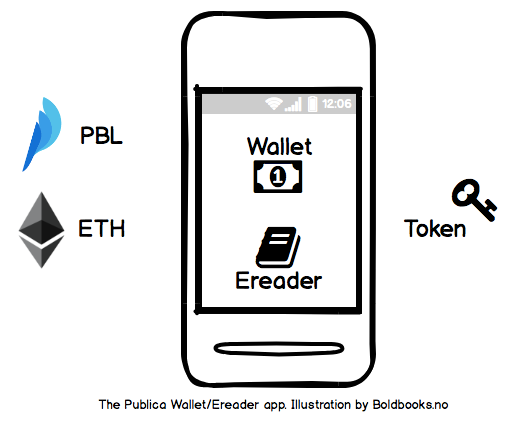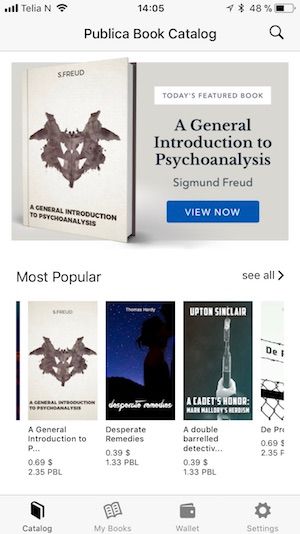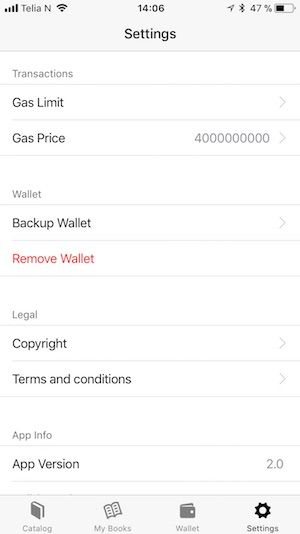
What blockchain means to authors and book publishing
Sist oppdatert for ett år siden
How blockchain can add value to the book publishing process, and contribute to new business models for independent authors.
Exactly 3 weeks ago, a historical happening took place. For the first time, it was possible to buy a book on the blockchain.
I will tell you more about this happening later, but first you need to know why blockchain seems so appealing to authors.
If you want to learn more about what the blockchain is, I recommend this TED-talk by Don Tapscott.
Many people have a story to tell or competence to share. And they would like to write a book about it.
The author’s problem
Getting through the needle’s eye of a publisher is not easy. About 1-5 % get accepted, and the rest rejected.
Some of them obviously because the book was not good enough. But certainly also because the publisher didn’t have the capacity for any more books, or the book wasn’t commercial enough to make money on it. Maybe because the niche was too narrow and the audience too small.
If you do get accepted by a publisher, you get only 10-15 % royalty of the book sales revenue. You also give away your rights to the book and you lose control over the publishing process.
A global movement
That is some of the reasons why many authors choose to become independent of publishers and publish their books themselves. Many authors also never contact a publisher, but prefer to go indie in the first place.
In the last 10 years, the publishing landscape has changed. Not so visible yet here in Norway, but there is a global movement going on, that started in the US, where there has been a boom in self-published books.
Amazon’s Kindle – the good news
10 years ago Amazon launched the Kindle. At the same time they also launched a website called Kindle Direct Publishing.
This is a publishing channel for independent authors, making it possible for anyone to upload their ebook and sell it on Amazon.
This has been a gift for independent authors. To be able to sell their book directly on the world’s largest book store. And with much better royalties than through traditional publishers, up to 70 %.
Indie authors are now selling more ebook units than the 5 biggest publishers on Amazon, in the US, according to AuthorEarnings.
This is good news for independent authors.
Amazon’s Kindle – the bad news
The bad news is that Amazon has grown too big.
Where all the other sales channels use the same international ebook format, called EPUB, Amazon has their own ebook format.
This makes a lock-in-situation where Amazon keep the users on their platform.
Some even claim that Amazon actually makes indie authors lose their independence. Because Amazon has started a program where they demand complete exclusivity for selling the author’s book, called KDP Select.
Amazon’s limitations
We like to think about Amazon as global, but for many countries it is actually not available at all.
Either because of the countries banking transfer system doesn’t connect with each other or because Amazon doesn’t support ebooks in that language.
Even if they do support the language, as they do with Norwegian books, they have restrictions.
Amazon says that if a Norwegian customer buys an ebook, the author will get only 35 % royalty, not 70 %. Just because the customer is from Norway.
One more thing, Amazon is just a sales channel, they don’t have any services to help the author make a quality book.
The new book industry
Self-publishing has always been possible, but to compete with traditionally published books, you also have to compete on quality. That’s why you need access to quality services. And you need them in your own language, because that’s what books are all about.
As the indie author movement in Norway also is growing, I had a business idea to help the Norwegian authors make quality books. So we started BoldBooks, a platform to gather all the services the author needs in one place.
In the new book industry there will be platforms that replace publishers and book stores, putting the reader and the author closer together. The author will be in charge, using the platform as an interface and facilitator of the book publishing process.
BoldBooks provide authors services
The core of what BoldBooks do is to provide author services. On our market place you can find freelancers like editors, cover designers, ebook and print production.
Over 100 Norwegian authors have so far used our self-service solution to make an author profile. And BoldBooks has become a hub for independent authors in Norway. On their profile the authors can present themselves.
BoldBooks meets Publica
In October I came across a website about independent authors and blockchain for book publishing. At first it seemed quite cryptical, and I thought: This is way into the future. This is science fiction.

BoldBooks and Publica have become partners. Kristin Over-Rein from BoldBooks speaking for the Norwegian Bitcoin and Blockchain Union.
The company’s name was Publica. They was just about to get funding for their startup. And as every blockchain startup do, they crowdfunded their own currency in the blockchain community.
Publicas blockchain protocol is just for publishing. Their currency is PBL, called pebbles, and uses the Ethereum blockchain. In November they managed to get the startup funded, by their crowd, buying Pebbles for 1 million dollars.
In December I met the CEO of Publica, Josef Marc, at the FutureBook Conference in London. We realized that we just had the same visions for the future of publishing. I made an interview with him that you can find on the BoldBooks YouTube channel.
ALLI’s white paper
Although publishers also could use the blockchain for book publishing, it is the authors themselves who seems most eager to explore this new technology.
The international Alliance of Independent Authors have made an initiativ about blockchain for books. They are making a white paper about blockchain for book publishing that they will present on the London Book Fair next month.
What does blockchain mean to authors?
Let’s get to the point here. Why would anyone sell and buy a book on the blockchain? What will blockchain mean to authors and the readers?
Global market
- The author can sell the book everywhere in the world
- The book becomes globally available, even to countries that have bad access to books
- The reader doesn’t need to have a credit card to buy a book, just a smart phone
Micro payments
- With traditional publishers authors get paid once a year
- On platforms like Amazon and BoldBooks usually every other month
- On blockchain it takes minutes, the payment go directly from the reader to the author, with minimal fees, so the author keep almost 100 % of the revenue
- It will be possible to make even smaller payments, with chapter subscriptions or pay-as-you-read solutions
Ownership and IP
- Who owns the rights to the book will become indisputable, because it is registered for forever into the blockchain
- It is not the ebook itself that is in the blockchain, but a token that is linked to the book. A token is like a key to open the book.
- If you buy a ebook today on Kindle, you don’t actually buy the book, you just buy a licence, like a software licence. That means you do not own the book, and you cannot do what you like about it, give it to a friend, like you can with paper books. If you buy a ebook on the blockchain, you will own it.
Secondhand marked for ebooks
- You can give the book away as a gift.
- You can buy a book, read it, and sell the book to someone else. And here is the smart part. You can resell the ebook and get a commission cut, so that the author also get a percentage of the price. Because that can be programmed into a smart contract in the blockchain.
- This opens many possibilities. For instance,
- Universities can publish their own ebooks and sell them directly to students, who can resell them the next year.
New business models for authors
- You can make agreements with other contributors to the book, like writers, editors or designers to split the revenue.
- And the same moment the book is bought, the money is divided among all the persons who owns a share of the book, and the payment get straight to their wallet, just as stated in the smart contract in the blockchain.
- You can let a person in another country translate your book for free. The translator can get the right to sell the book, and a cut instantly goes back to you as an author each time a book got sold.
- You could have these, and any other business model you could think of. With very little administration, because it is programmed and automated by smart contracts in the blockchain.
In October, when I first heard about this, I thought it was science fiction. But now, only half a year later, it is already beginning to come into reality.
The Publica app
Let me finish off by showing you my own experience of buying a book in the blockchain. Actually I was one of the first persons in the world to do this, to take part of this historical happening.
Publica is making an app that is a combined cryptocurrency wallet and a tool to buy and read ebooks. A wallet/ereader app.

By now you must buy the book with Pebbels. And you need a small amount of Ethereum for gas, to the miners. When you buy the book you get a BOOK token that is the key to open the book.
Buying a book on blockchain
Now in March the alpha test version of the Publica app was ready. BoldBooks is a pilot for Publica, so I downloaded it to my phone. I took some screenshots of the process:






By now it is not so user-friendly. Because the consumer needs to own cryptocurrency to buy a book. But soon Publica will make it possible for the consumer to pay with local currency, for instance dollars or Norwegian kroner.
A wakeup call to the book industry
Of course this challenges our own business model. But BoldBooks will adapt to the new technology and help our authors to sell their books through blockchain.
The possibilities that the blockchain introduce should be a wakeup call to the book industry.
It is a reminder that the most important actor in the value chain is the content creator. The author of the book is the one that really is making the value.
It reminds us that information is valuable. That your knowledge and stories are worth something to someone. And that no big companies should own exclusive rights to sell your story.
The future of book publishing
I believe future of book publishing will be centered around the author. There will be room for a diversity of books, because there is an audience for every story, even the smallest niches.
Because this is about freedom of speech. This is about democracy. And this is about sharing of thoughts between human beings.
Thank you.
This is a transcript of the speech Kristin Over-Rein from BoldBooks held for the Norwegian Bitcoin and Blockchain Union March 22. 2018. The speech was livestreamed on Facebook (speech starts at about 4:30).
Meld deg på vårt nyhetsbrev!
- Aurskog Næringspark
- 1930 Aurskog
- Org.nr: 917 634 327
- post@boldbooks.no





